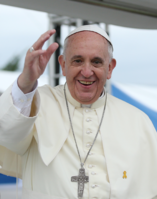
Photo from wikipedia
This article explores the paradox between Pope Francis’s success as a critic of global markets and the limitations of his religious capital in his home country of Argentina. While for… Click to show full abstract
This article explores the paradox between Pope Francis’s success as a critic of global markets and the limitations of his religious capital in his home country of Argentina. While for some observers it might be obvious that the pope can influence people’s thinking about social and political matters, the findings of this article highlight the role of ‘non-specialist’, ordinary believers in setting limits to Francis’s religious power. Using Bourdieusian theory and a ‘lived religion’ methodological approach, I explore the agency of ordinary believers in the religious field. By studying the limits regular believers established to the efficacy of Pope Francis’s religious capital, we better understand how the agency of non-specialists operates in the religious field. This research is based on a non-random sample of semi-structured, in-depth interviews of 42 lower socioeconomic status interviewees, self-identified as Catholics, Evangelicals, Others and Non-Affiliated; conducted in Córdoba, Argentina from November 2015 to December 2016.
Journal Title: Sociology
Year Published: 2019
Link to full text (if available)
Share on Social Media: Sign Up to like & get
recommendations!